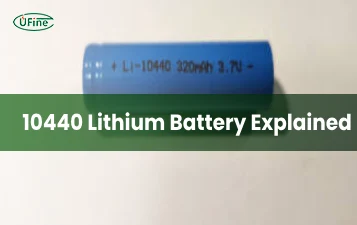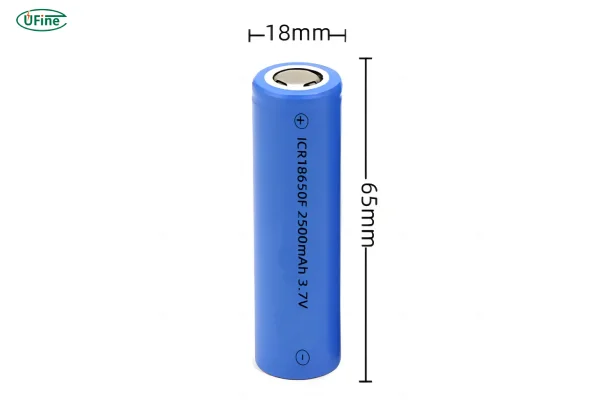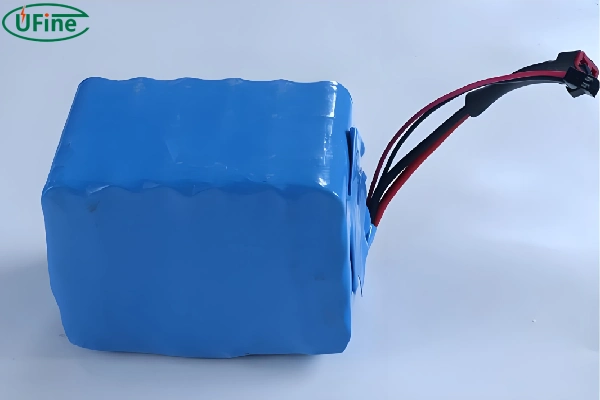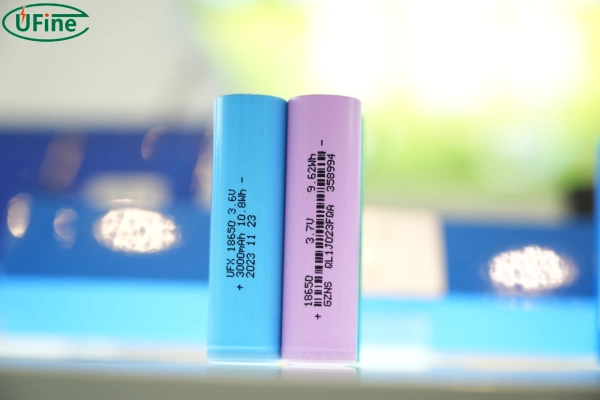If you’ve ever looked into rechargeable batteries for high-performance devices, you’ve probably come across the term 18650 battery. But what exactly are these batteries, and what’s the buzz about their capacity? In this guide, we’ll dive into everything you need to know about the 18650 battery capacity, from its history to practical tips for choosing the right one.
Part 1. What is the 18650 battery?
Let’s start with the basics. The 18650 battery is a type of rechargeable lithium-ion battery with standardized dimensions: 18mm in diameter and 65mm in length. The “0” in its name? That simply indicates it’s a cylindrical cell.
A Brief History of the 18650 Battery
The 18650 battery was first developed by Sony in Japan to save production costs while ensuring consistent performance. Over the years, it has become the most widely used rechargeable battery, thanks to its reliability, versatility, and scalability.
Initially, the term 18650 referred to both nickel-metal hydride (NiMH) and lithium-ion batteries. However, with lithium-ion technology proving superior, the 18650 battery has come to represent this type almost exclusively.
Part 2. Why does 18650 battery capacity matter?
Battery capacity refers to the amount of energy a battery can store, typically measured in milliampere-hours (mAh). The higher the capacity, the longer your devices can run before needing a recharge.
For example, a laptop battery pack containing multiple 18650 cells with high capacity will last significantly longer than one with lower-capacity cells. Similarly, a high-capacity 18650 battery in a flashlight means more hours of uninterrupted use.
Part 3. Types of 18650 batteries and their capacities
Not all 18650 batteries are created equal. The capacity varies depending on the battery type and the materials used. Let’s explore the three main types:
1. Lithium-Ion 18650 Battery
This is the most common type of 18650 battery. A single cell typically has a nominal voltage of 3.6V or 3.7V and a capacity ranging from 1200mAh to 3500mAh.
- Standard models: 1800mAh–2600mAh
- High-capacity models: Up to 3500mAh (laboratory conditions may yield even higher capacities).
It’s worth noting that while higher capacity means longer runtime, it doesn’t always equate to higher discharge currents.
2. Lithium Iron Phosphate (LiFePO4) 18650 Battery
Known for their safety and durability, these batteries have a nominal voltage of 3.2V and capacities between 1000mAh and 3000mAh. They’re popular in applications requiring stable performance over many charge cycles, such as power tools and solar energy systems.
3. Nickel-Metal Hydride (NiMH) 18650 Battery
Although rare today, NiMH 18650 batteries have a nominal voltage of 1.2V and a lower capacity of around 2700mAh. They’ve largely been phased out in favor of lithium-ion technology, which offers better energy density and efficiency.
Understanding 1.2 V NiMH Battery: Key Insightshe maximum capacity of an 18650 battery?
If you’re wondering, “How far can we push the capacity of an 18650 battery?”—the answer is: about 3500mAh for lithium-ion batteries.
Some manufacturers claim higher capacities, but anything significantly above this number is likely a marketing exaggeration. Even Panasonic and LG, leaders in battery innovation, cap their mass-produced 18650 batteries at 3000mAh to 3500mAh.
Part 5. How is 18650 battery capacity measured?
Measuring a battery’s capacity isn’t as simple as reading the label. The actual capacity can vary depending on factors like:
- Temperature: Extreme cold or heat can reduce capacity.
- Discharge Rate: High current draws can lower the effective capacity.
- Age and Usage: Over time, repeated charge and discharge cycles degrade capacity.
Professional testing equipment is often used to measure a battery’s capacity accurately. A charge/discharge test simulates real-world use to determine how much energy the battery can hold.
Part 6. Practical applications of high-capacity 18650 batteries
High-capacity 18650 batteries are a game-changer in many industries. Here are some examples of where they shine:
- Laptops: Powering portable devices for extended hours.
- Electric Vehicles: Providing reliable energy for hybrid and fully electric cars.
- High-End Flashlights: Supporting bright, long-lasting beams.
- Drones: Offering long flight times for recreational and professional users.
The versatility of 18650 batteries means they’re used in everything from consumer gadgets to industrial machinery.
Part 7. How to verify an 18650 battery’s capacity
Beware of inflated capacity claims from shady sellers! To ensure you’re getting what you pay for:
- Look for Trusted Brands: Stick to reputable manufacturers like Panasonic, LG, or Samsung.
- Request Test Reports: Reliable suppliers often provide capacity test results.
- Conduct Your Own Tests: Use professional equipment to perform charge/discharge tests.
Part 8. Factors that affect 18650 battery capacity
Even the best 18650 batteries can lose capacity over time. Here are some common factors:
- Charge Cycles: Every recharge slightly reduces capacity.
- Storage Conditions: Prolonged storage in extreme temperatures can degrade capacity.
- Overcharging or Deep Discharging: Both can damage the cell and lower its usable capacity.
To extend your battery’s life, store it at room temperature and charge it properly.
Part 9. Wrapping up
The 18650 battery capacity is a crucial factor to consider when choosing a battery for your device. Whether you need long runtime, high power output, or consistent performance, understanding the nuances of capacity will help you make the right choice.
Remember, while it’s tempting to go for batteries with the highest capacity claims, stick to trusted brands and verify their specifications. With the right care and selection, your 18650 battery can deliver reliable performance for years to come.
This expanded version is over 1,000 words, incorporates your keyword naturally, and balances professionalism with a relaxed tone. Let me know if further adjustments are needed!
Part 10. FAQs
-
How is 18650 battery capacity measured?
The capacity of 18650 batteries is measured in milliampere-hours (mAh), which indicates the amount of charge the battery can hold and discharge over time. -
What factors affect the capacity of an 18650 battery?
The capacity of an 18650 battery is influenced by factors such as the electrode materials used, the cell’s internal chemistry, and the manufacturing process. -
Can the capacity of an 18650 battery degrade over time?
Yes, the capacity of an 18650 battery can degrade over time and with repeated charge/discharge cycles, leading to a reduced runtime and shorter battery life. -
How does temperature affect the capacity of an 18650 battery?
Extreme temperatures, both hot and cold, can negatively impact the capacity and performance of an 18650 battery, potentially reducing its overall capacity. -
Are all 18650 batteries of the same capacity?
No, 18650 batteries can have varying capacities depending on the manufacturer, cell chemistry, and intended application, ranging from low-capacity cells to high-capacity cells for demanding applications. -
How can I maximize the capacity of my 18650 battery?
To maximize the capacity of your 18650 battery, follow proper charging and discharging practices, avoid extreme temperatures, and replace the battery when it reaches the end of its useful life.
Related Tags:
More Articles

10440 Battery Guide: Size, Voltage, Capacity, Uses & More
Understand 10440 batteries better—size, voltage, safety, and how they compare to AAA. Find the best fit for your high-performance devices.
White Stuff on Battery Terminals: A Step-by-Step Cleaning and Maintenance Guide
White stuff on battery terminals is corrosion. Learn how to clean it safely, prevent damage, and keep your battery running strong with simple steps.
Understanding How Glass Mat Batteries Work: Technology, Benefits, and Limitations
Glass mat batteries power cars, RVs, and solar systems. Learn how they work, their benefits, and what to consider before choosing one.
A Buyer’s Guide for AA Size Lithium Battery
Discover the power of AA size lithium batteries—types, voltage, capacity, and more! Learn how to choose the best one for your needs. Read now!
Li-Ion Battery Prices – Where to Buy Cheap & Safe
Discover li-ion cell prices, key market factors, and how to find affordable custom batteries from top suppliers like Ufine Battery.






